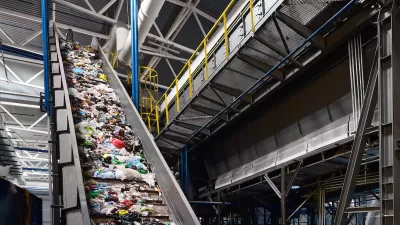Due to consumers cutting back, the global market for recyclables has collapsed and even begun to cost some cities' recycling programs.
"Mountains of paper are now piling up in warehouses across the US. A handful of recyclers have already gone out of business. If prices don't rebound soon, taxpayers could see their recycling bills increase as cities decide to follow Fountain Inn's lead and cut back their recycling programs – once a reliable revenue source – or start paying to keep them. "
"Still, there's some optimism that the current crisis will be short-lived. Cities can expect less revenue from its recycling operations, but recycling won't simply disappear, says Jorge Santiesteban, solid resources manager for the city of Los Angeles.
In the short term, domestic recyclers can recoup some losses by charging higher collection fees – as Fountain Inn did. And most large cities negotiate long-term contracts with minimum prices to keep revenue flowing.
Some states are mulling systemic changes, like requiring domestic producers to use more recycled material in their products. In California, says Mr Santiesteban, there is an awareness that "the infrastructure has to be rebuilt" to make it less reliant on the export market. "
FULL STORY: Economic crisis hits city recycling

Americans May Be Stuck — But Why?
Americans are moving a lot less than they once did, and that is a problem. While Yoni Applebaum, in his highly-publicized article Stuck, gets the reasons badly wrong, it's still important to ask: why are we moving so much less than before?

Study: Maui’s Plan to Convert Vacation Rentals to Long-Term Housing Could Cause Nearly $1 Billion Economic Loss
The plan would reduce visitor accommodation by 25,% resulting in 1,900 jobs lost.

Placekeeping: Setting a New Precedent for City Planners
How a preservation-based approach to redevelopment and urban design can prevent displacement and honor legacy communities.

San Diego Swaps Parking Lane for Kid-Friendly Mini Park
The block-long greenway will feature interactive play equipment and landscaping.

Tracking the Invisible: Methane Leaks From LA’s Neighborhood Oil Sites
Environmental advocates are using infrared technology to monitor and document methane leaks from neighborhood oil sites, filling regulatory gaps and pushing for stronger protections to safeguard community health and the climate.

Montana Bill Promotes Parking Reform
A bill before the Montana state senate would bar cities from requiring more than one parking spot per new housing unit.
Urban Design for Planners 1: Software Tools
This six-course series explores essential urban design concepts using open source software and equips planners with the tools they need to participate fully in the urban design process.
Planning for Universal Design
Learn the tools for implementing Universal Design in planning regulations.
Caltrans
Heyer Gruel & Associates PA
Institute for Housing and Urban Development Studies (IHS)
City of Grandview
Harvard GSD Executive Education
Salt Lake City
NYU Wagner Graduate School of Public Service
City of Cambridge, Maryland





























